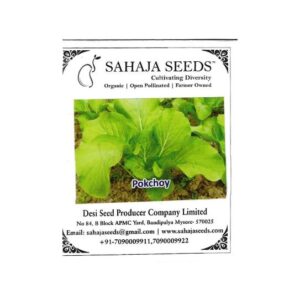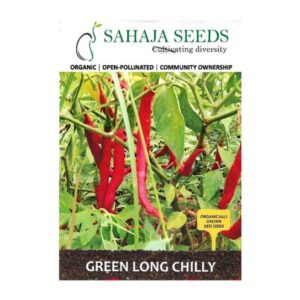No products in the cart.
Vegetables
Sahaja Bokchoy Seeds
Our Bok Choy Seeds offering crisp, flavorful leaves and nutritious goodness in every harvest. These open-pollinated seeds produce vibrant dark green leaves with tender white stems, perfect for stir-fries, salads, and more. With a maturity time of just 45-60 days, they thrive in zones 2-11, making them suitable for a wide range of climates. Easy to grow and packed with vitamins and antioxidants, our Bok Choy Seeds promise a delicious and healthy addition to your garden.
₹50.00
Additional Notes
– This desi variety is known for its medium size, compact shape, and tolerance to both heat and cold. It has dark green leaves, short petioles, and exhibits very slow bolting. It is suitable for planting in the spring, summer, and fall seasons.
Growing Instructions for Bok choy seeds:
- Soil Preparation:
– Start with fertile, well-drained soil for optimal growth.
– Ensure the soil is prepared with organic matter and nutrients.
- Sowing Seeds:
– Sow the seeds in the spring after the last frost or in early summer.
– Alternatively, you can sow seeds in late summer or early fall for a different growing season.
– Keep the soil consistently moist during the germination and early growth stages.
- Moisture Management:
– Maintain soil moisture throughout the growing period.
– Adequate watering is crucial, especially during dry spells.
- Fertilization:
– Fertilize the plants as needed based on the nutrient requirements of cabbage.
– Consider using a balanced fertilizer to support healthy growth.
- Temperature Preferences:
– Optimal growing temperatures are in the 60s°F (15-25°C).
– Pak Choi is sensitive to extreme temperatures, and exposure to frost or prolonged temperatures below 50°F may lead to bolting.
- Mulching (For Fall Crops):
– Mulch around fall crops to regulate soil temperature and moisture.
– This helps to avoid premature bolting, ensuring a longer harvest period.
- Harvesting:
– Harvest Pak Choi when the leaves are young and tender for the best flavor and texture.
– Use in stir-fries, sautés, or braised dishes to enjoy its unique taste.
Note; Adjust planting times based on local climate conditions and follow best practices for cabbage cultivation to maximize the yield and quality of the harvest.
- Basic Info– Cabbage Seeds: Bok Choy Seeds– Days to Maturity: 40-50 days– Growing Season: Cool-warm season– Lifecycle: Annual
– Genetic Modification: Non-GMO
Characteristics
– Size: Medium-sized
– Maturity: Medium
– Shape: Compact with a nice shape
– Leaf Color: Dark green
– Petioles: Short
– Heat Tolerance: Yes
– Cold Tolerance: Yes
– Bolting: Very slow bolting
Based on 0 reviews
Be the first to review “Sahaja Bokchoy Seeds”
You may also like…
-
Vegetables
Sahaja Cabbage Seeds
Elevate your garden with our premium Cabbage seeds, promising robust growth and flavorful harvests. With varieties ranging from classic green to vibrant red and savoy, these seeds thrive in diverse conditions. Whether enjoyed fresh in salads or cooked in a variety of dishes, Cabbage adds nutrition and versatility to your culinary creations. Start your cabbage patch today and enjoy the satisfaction of homegrown goodness.
SKU: SH017 -
Insecticides
Finish It (All in one Larvicide)
Finish-It a bio-larvicide / bio-pesticide acts as an antifeedant with a combination of Pongamia pinnata (Karanja), Jatropha curcuras and Azadirachtin and also live entomopathogenic nematodes and parasitic microorganisms that are helpful against all pests going through the larvae stage. Works preventively and curatively by killing all stages of LEAF MINER.
SKU: KT007 -
Nutrition, Vegetables
Sahaja Cauliflower Seeds
Elevate your garden/farm with our premium Cauliflower seeds, offering a diverse range of varieties for every palate. Thriving in various conditions, these seeds promise robust growth and abundant harvests. Whether enjoyed fresh, roasted, or mashed, Cauliflower adds versatility and nutrition to your culinary creations. Start your cauliflower patch today and experience the satisfaction of homegrown goodness.
SKU: SH018 -
Vegetables
Sahaja Pokchoy Seeds
Elevate your garden with our premium Pak Choi seeds, carefully selected for their exceptional flavor and easy-growing characteristics. With crisp stems and tender, dark green leaves, Pak Choi adds versatility to your culinary creations, whether raw in salads or cooked in stir-fries. Packed with vitamins and minerals, it’s a nutritious addition to any diet. Start your Pak Choi adventure today and enjoy a bountiful harvest of fresh, homegrown goodness.
SKU: SH013










There are no reviews yet.